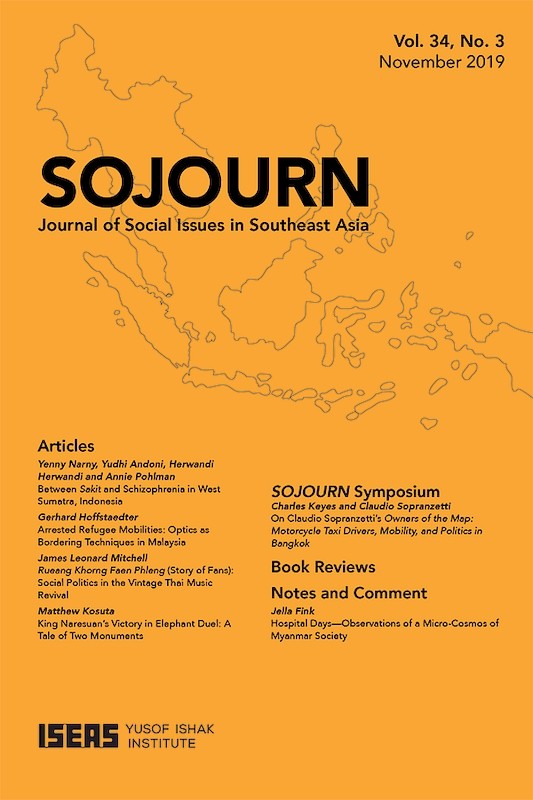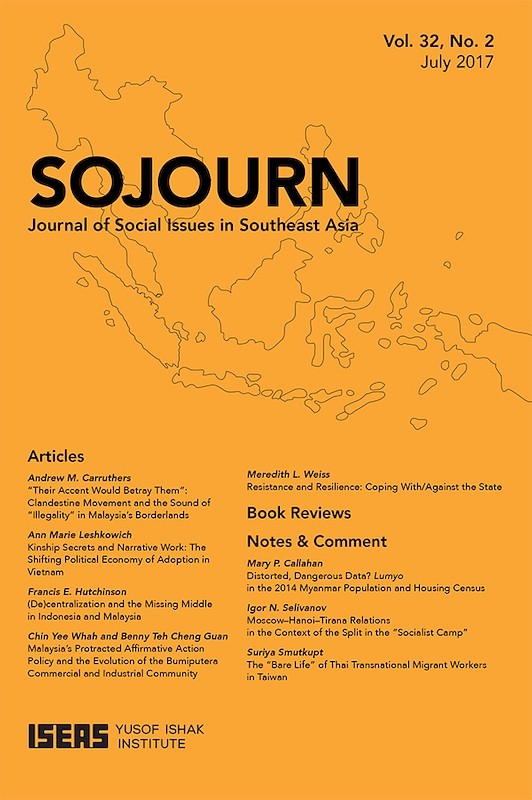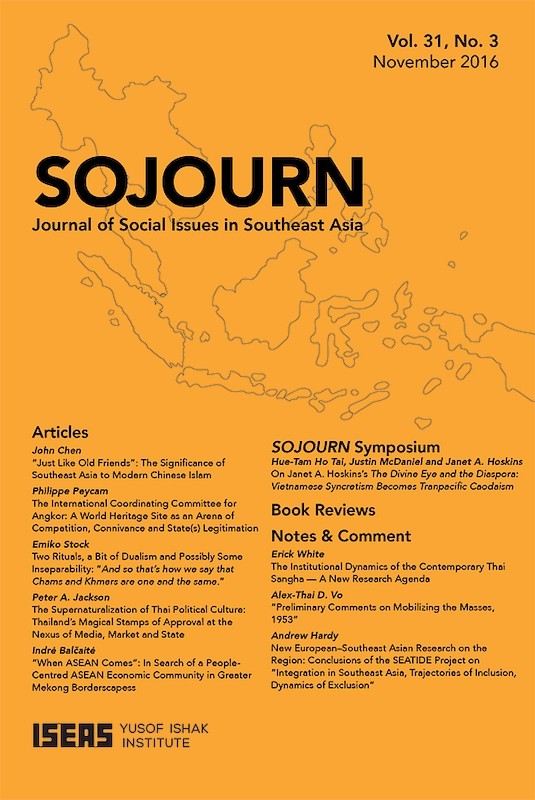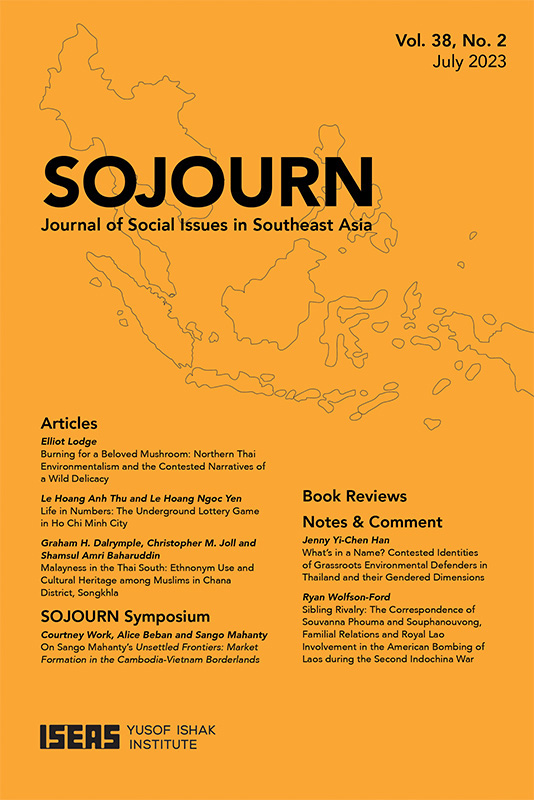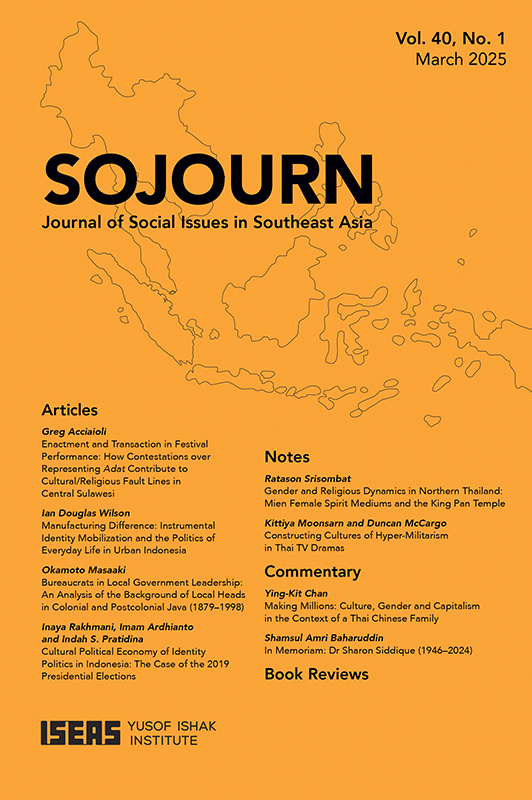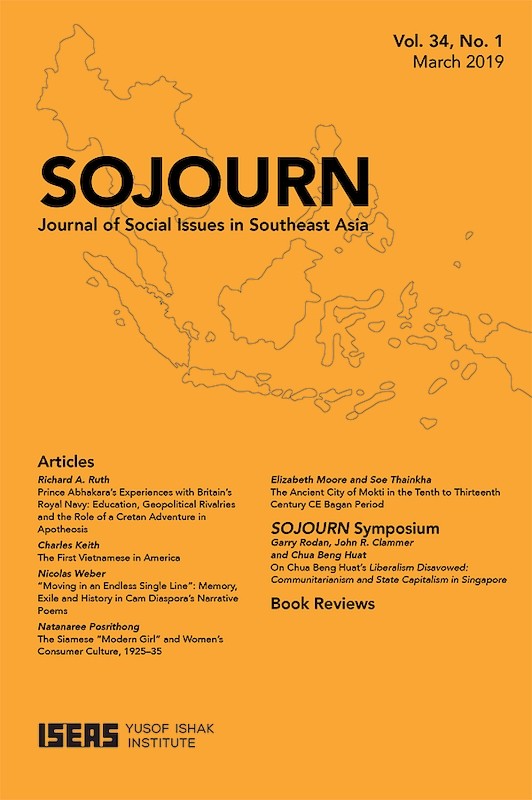SOJOURN: Journal of Social Issues in Southeast Asia Vol. 31/2 (July 2016)
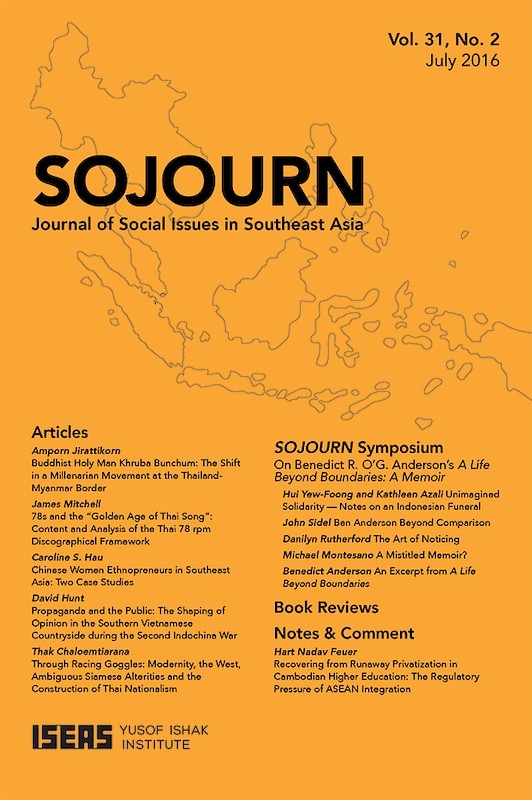
Michael J Montesano, editor
Date of publication:
July 2016
Publisher:
ISEAS – Yusof Ishak Institute
Number of pages:
307
Code:
SJ31/2
Contents
-
SOJOURN: Journal of Social Issues in Southeast Asia Vol. 31/2 (July 2016)
[Whole Publication, ISSN: 17932858] -
Preliminary pages
- ARTICLES
-
Buddhist Holy Man Khruba Bunchum: The Shift in a Millenarian Movement at the Thailand–Myanmar Border, by Amporn Jirattikorn, author see abstract<p class="p1">The study of holy men active in Thailand, Laos and Myanmar between the seventeenth and the twentieth centuries has associated them primarily with millenarian movements. In the twenty-first century, the Thailand–Myanmar border has seen the emergence of a holy man to whom the concept of millenarianism is, in the current changing religious environment, not applicable. Khruba Bunchum, a contemporary Thai monk with a significant ethnic minority following in Myanmar, rose to fame in Thailand after being forced to leave Myanmar and spending three years meditating in an isolated cave. He has gained followers among wealthy and middle-class Thais. His case illustrates the effect of mobile media technology in transforming the practice of venerating holy men. It suggests the need for a new approach to studying religious movements, one that draws on religious, political and media sources. </p>
-
78s and the Golden Age of Thai Song: Content and Analysis of the Thai 78 rpm Discographical Framework, by Mitchell Tan, author see abstract<p class="p1">The Thai 78 rpm Discographical Framework is a complete listing of all known 78 rpm recordings of Thai music, the first of its kind for any Southeast Asian nation. Initial analysis of the Framework and its content suggests that a significant but as yet unacknowledged factor in the “golden age of Thai song” in the 1960s was the overlap between 78 rpm technology and 45 and 33 rpm technology. When major companies abandoned the 78 rpm format, singer-songwriters and small publishing companies gained a foothold in the Thai recording industry. The result was the industry’s fragmentation and increased creativity. </p>
-
Chinese Women Ethnopreneurs in Southeast Asia: Two Case Studies, by Caroline S Hau, author see abstract<p class="p1">Both Chitra Konuntakiet from Thailand and Lillian Too from Malaysia capitalize on their claims of and access to “Chineseness” and “Chinese culture” to pursue successful careers as “ethnopreneurs”. The historical timing, political and economic contexts, and intellectual and ideological underpinnings of their acts of cultural arbitrage account for how these “Anglo-Chinese” women can profit from national and cultural differences within and between nations to promote hybridized national identities and propound gendered visions and practices of entrepreneurship that draw on, but are not reducible to, the prevailing ideologies and imageries of male-powered “Chinese” transnational capitalism. </p>
-
Propaganda and the Public: The Shaping of Opinion in the Southern Vietnamese Countryside during the Second Indochina War, by David Hutt, author see abstract<p class="p1">In the Mekong Delta province of Mỹ Tho, village populations paid attention to print and electronic media controlled by the Government of Vietnam in Saigon and by the National Liberation Front during the early 1960s. They also relied for news on rumours and on information circulating on the grapevine. At first, NLF militants benefited from their dialogue with an ascendant rural public. But after 1965 mounting violence complicated Front efforts to stay in touch with its mass base, and the grapevine assumed an even greater importance for people in the countryside. On the eve of the Tet Offensive of 1968, the choices made by rural dwellers helped to determine the course of the Second Indochina War. </p>
-
Through Racing Goggles: Modernity, the West, Ambiguous Siamese Alterities and the Construction of Thai Nationalism, by Thak Chaloemtiarana, author see abstract<p class="p1">Prince Chulachakrabongse and Prince Birabongse Bhanudej were sent to England to study at Harrow and Eton in the 1920s. They lived as Thai princes among the English upper class and indulged in the pastimes of that class, such as athletics, flying and motor car racing. Bira became a successful race car driver on the White Mouse Racing Team, managed by Chula. He even won the Gold Star, awarded to the best “British” race car driver, in three consecutive years — 1936, 1937 and 1938. His achievements were celebrated in Siam as a sign of national greatness and of Siam’s parity with the West. Racing was and still is closely associated with the nation. Bira’s and Chula’s story contributes to the study of the top-down construction of Thai nationalism. Thai nationalism is not about an armed struggle against colonial oppressors. It is about mastering Western civilization in attempts to appear equal. It is a nationalism closely associated with the monarchy, members of the royal family, aristocrats and bureaucratic servants of the crown. </p>
- SOJOURN SYMPOSIUM
-
A Life Beyond Boundaries: A Memoir. By Benedict R. O'G. Anderson. Review essays by John Sidel, Danilyn Rutherford and Michael Montesano, with an introduction from Hui Yew-Foong and Kathleen Azali, and an excerpt from Benedict Anderson's final book., by Hui Yew-Foong, Kathleen Azali, John Sidel, Danilyn Rutherford, Michael J Montesano, Benedict R O'G Anderson, authors
- BOOK REVIEWS
-
BOOK REVIEW: Studies in Thai and Southeast Asian Histories by Charnvit Kasetsiri. With an introduction by Barbara Watson Andaya, by Patrick Jory, author
-
BOOK REVIEW: Embodied Nation: Sport, Masculinity, and the Making of Modern Laos by Simon Creak, by Oliver Tappe, author
-
BOOK REVIEW: Reworlding Art History: Encounters with Contemporary Southeast Asian Art after 1990 by Michelle Antoinette, by Nora A Taylor, author
-
BOOK REVIEW: Of Whales and Dinosaurs: The Story of Singapore's Natural History Museum by Kevin Y.L. Tan, by Jennifer R. Morris, author
-
BOOK REVIEW: Vietnamese Traditional Medicine: A Social History by C. Michele Thompson, by Allen Tran, author
-
BOOK REVIEW: Privilege and Prejudice: The Life of a Black Pioneer by Clifton R. Wharton Jr., by Michael J Montesano, author
- NOTES & COMMENT
-
Recovering from Runaway Privatization in Cambodian Higher Education: The Regulatory Pressure of ASEAN Integration, by Hart Nadav Feuer, author see abstract<p class="p1">Since opening to the international community following the Paris Peace Accords in 1991, Cambodia has incrementally adopted a stance of political liberalization. Whether because of the exigencies of reconstruction and development or by intention, large tracts of the institutional domain have been delivered into the hands of development agencies, corporations, non-governmental organizations and other private entities. Higher education was no exception, witnessing runaway growth in private-sector capacity in a lax regulatory environment since the mid-1990s. Despite more recent regulatory assertiveness reflecting the government’s enhanced capacity, the imminent processes of regional integration in ASEAN are again diminishing the Cambodian state’s autonomy and room to maneuver. </p>

